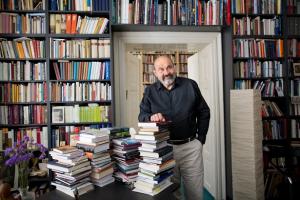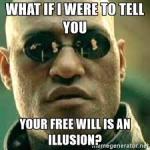In our recently completed “Faith and Doubt” colloquium, my Dominican priest colleague and I filled the syllabus with authors who have shaped our own perspectives on and continuing lives of faith. I have written about mine many times over the decade of this blog’s existence; Anne Lamott, Michel de Montaigne, Simone Weil, Dietrich Bonhoeffer, Iris Murdoch, and Rachel Held Evans all made important appearances during the semester.
 My colleague’s influences included several who also are on my list, including Soren Kierkegaard, Friedrich Nietzsche, and Fyodor Dostoevsky, all of whom have been fellow companions on my faith journey for years. The author on my colleague’s list who captured my imagination most, however, was someone whose work I was completely unfamiliar with until we taught this course for the first time a year ago: Czech Catholic priest, philosopher, theologian, and psychologist Tomáš Halík.
My colleague’s influences included several who also are on my list, including Soren Kierkegaard, Friedrich Nietzsche, and Fyodor Dostoevsky, all of whom have been fellow companions on my faith journey for years. The author on my colleague’s list who captured my imagination most, however, was someone whose work I was completely unfamiliar with until we taught this course for the first time a year ago: Czech Catholic priest, philosopher, theologian, and psychologist Tomáš Halík.
Halík made his first appearance ever on this blog a week ago; I suspect he’ll be showing frequently throughout the summer as I read Night of the Confessor, my colleague’s favorite of Halík’s many books, a second time.
Halík’s theological insights are striking, and I’ll get to a few of them, but I must admit that one of the first things that attracts me to his work is his curmudgeonliness (spell check says that isn’t a word, but it should be), a feature that matches up to the same quality in me on certain matters. For instance, Halík apparently hates academic/professional conferences as much as I do. He describes one clergy conference he was forced to attend as follows:
I have the feeling . . . that I have been catapulted into Sartre’s play No Exit, where, after a while, the auIdience realizes that all the protagonists are dead but behave as if nothing has happened. One Czech priest compared the Church to a mill that still clattered away but no longer ground anything.
Tell me about it, Father. One of the many blessings of being a full professor is that I no longer need to pad my resumé with attending such gatherings for which Dante should have assigned a special circle in hell.
Halík also shares my constitutional aversion to what he calls “clappy-happy religion.” “Discreet Faith,” my favorite chapter in Night of the Confessor, is shaped by Halík’s refusal to accept the invitation of a couple of enthusiastic young people to attend a Christian mega-rally that they are very excited about. “No, I’m sorry, I really won’t come,” Halík replies. Why?
I myself came to faith slowly through a process of doubt; I find it hard to imagine being suddenly infected by collective piety at some mass rally with banners reading JESUS LOVES YOU and cheerleaders with unbearably fixed smiles. . . Naturally I respect the fact that there are those who feel the need to be crushed in a crowd of like-minded people to strengthen their faith. My faith would more likely be lost in a throng like that.
Halík knows, as I do, that at least some of his resistance to such worship and expressions of faith is simply a reflection of his basic personality.
His real issue, though, is with “the brazenly casual way that people there trumpet out the great words of our faith. Halík quotes Nicholas Lash favorably, who writes that ““it is the tragedy of modern Western culture to have fallen victim to the illusion (widely shared by believer and nonbeliever alike) that it is perfectly easy to talk about God.” Such overfamiliarity with the transcendent leads to any number of “idols,” models of the divine that have been crafted out of human projections with little respect for the mystery and “otherness” of God.
Halík advises that “when someone is introduced into the faith they need to be told clearly that they are being introduced into a world of mystery and depth.” It is occasionally helpful in the life of faith to list the various models of God that have over time proven to be insufficient—the gods that one does not believe in. I did this not long ago in this blog.
Halík provides us with his personal list of Gods that he does not believe in:
- The enlightenment’s god of reason, its “Supreme Being”
- The deist’s “Great Watchmaker”
- The ancient Greeks’ immutable Fate or the Muslims’ kismet
- The Gaia goddess or Mother Nature and her objective laws
- The law of karma and the cycle of birth and rebirth
- A private god, who would be an utterly private light of my conscience and my heart
- A romantic god that would offer itself solely as a “religious sense” or “the starry heavens above me and the moral law within me.”
So what does Halík believe in? He claims that “my faith is ordinary: a universal, catholic, Christian faith,” nothing exceptional or special.
In my experience, though, the totality of what he is describing is anything but “ordinary” from the perspective of nominal Christians. That’s because Halík always is careful to remind us that “[God] remains fundamentally incomprehensible, and it is impossible for all [our] natural capacities to recognize and see [God] in this life face to face. Accordingly,
A touch of skepticism, irony, and commitment to critical reason as a permanent corrective to any tendency to superficial religious enthusiasm is, in my view, not only a necessary condition for mental and spiritual health, but also a prerequisite if we are not to drown out the real voice of God with our own whooping and shouting.
The Christian story is that God is both immanent and transcendent, both intimately with us and ontologically “other.” Because this is clearly paradoxical, the tendency is often to focus exclusively on one aspect or the other, on either making God so “here” that all mystery is dissolved into familiar human categories or so “other” that God becomes so remote and disconnected from human beings as to be non-existent.
Halík’s insight is to embrace the paradox and recognize that “God’s place is in the ‘kingdom of the impossible,’ in the ‘kingdom of absurdity,’ somewhere where a totally different logic applies that in ‘this world’—the logic of the paradox.”
People’s attempts to penetrate the mystery of God’s essence inevitably go astray; maybe there is only one path where we might conceivably encounter the ever-astonishing kingdom of the impossible, that is coming. That path is the path of paradox.













